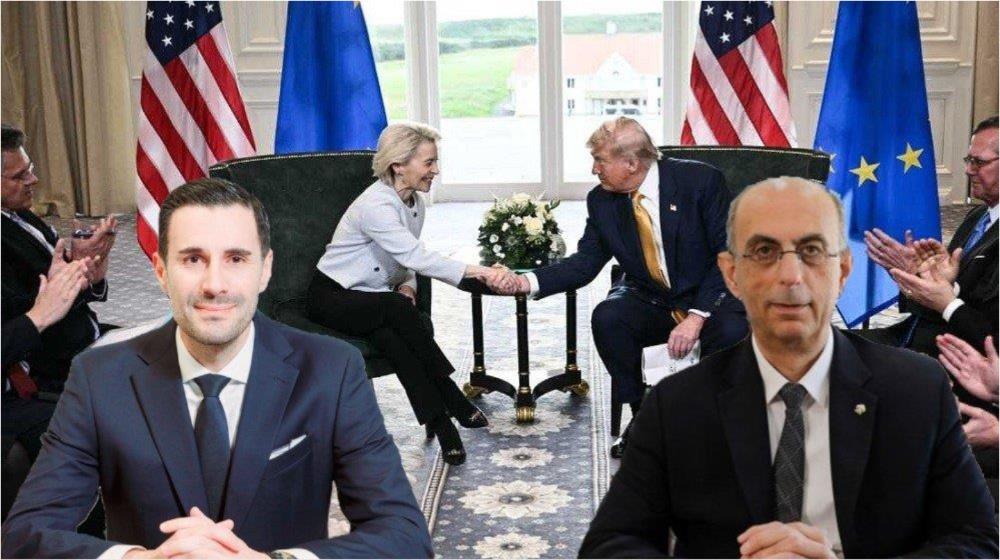The achievement of a trade agreement between the European Union and the United States has brought relief to the global and, by extension, Cypriot business sector, putting an end to the uncertainty caused by the first day of Donald Trump's inauguration, when he declared a trade war with almost the entire planet.
In fact, the agreement was reached a few days before 1 August, the date on which Trump had warned that he would impose 50% tariffs on all European products imported into the US, which would lead to further escalation of the crisis between the two sides, with each side imposing increasingly harsh countermeasures.
Now, following the agreement to impose 15% tariffs on European goods imported into the US, the business world expects the European Central Bank to review its decisions and proceed with further interest rate cuts, giving a boost to Eurozone growth, which is forecast to be weak this year.
Business activity in a stable environment
In his statements to InBusinessNews, the Secretary General of the Cyprus Chamber of Commerce & Industry, Philokypros Roussounides, stated that the business world welcomed the EU-US agreement "with relief and with a positive lens, in the sense that instability and uncertainty in international trade will cease to exist - at least for the foreseeable future," noting that "we saw that the markets also reacted positively."
"It is positive and pleasing that proper planning can now be done and commercial and business activity can continue in a stable environment, the more stable it is, the more contained the costs will be," he added.
According to Roussounides, "instability and uncertainty mean multiple costs and generally dysfunction and irregularities in international trade, which always have serious and negative impacts on businesses, but also on the consumer himself."
Therefore, he concluded, with the agreement, stability and normality are restored and the business world welcomes it.
Better a difficult agreement than maintaining uncertainty
On his part, the Director General of the Cyprus Employers & Industrialists Federation (OEB)OEB, Michael Antoniou, also speaking to InBusinessNews, stressed that the achievement of a trade agreement between the US and the EU is a positive development, which brings relief.
"It is certainly not pleasant to impose tariffs on a trade relationship with your strongest trading partner (i.e. EU and US), but it is much better to have a very difficult agreement than to maintain an environment of uncertainty, insecurity and liquidity, which has been in place since Trump's election," he pointed out.
According to Antoniou, "after reaching the agreement, we return to conditions of predictability and stability, which is a basic prerequisite for business to be able to do its job."
"Certainly 15% is higher than the 4.8% that were the tariffs on European goods and products in the American market, but it is much better than the 30% that would come into effect on Friday (1 August) or the 50% that the American President threatened when he took office, or even worse than the hard bottom that we would have from Friday onwards if we did not reach an agreement," he added.
This is because, as Antoniou explained, "Trump's 30% on European products would have an immediate response with additional tariff burdens on American products in the European market, which would cause additional tariffs on the part of the US on European products, which would lead to additional countermeasures on the part of the EU, which would lead at the end of the day to a race to the bottom."
"Something like this would destroy both business and consumers," he estimated, reiterating that reaching a trade agreement is a positive development.
The positive side effect
At the same time, the Director General of OEB also spoke of a positive side development. "With the conclusion of an agreement, despite - I repeat - the permanent and established position that tariffs are not something positive, since they do not favor business, I estimate that we will also have an impact on lending interest rates."
Asked to state what he bases his assessment on, Antoniou said that "now the risk of causing additional inflationary pressures through the imposition of unreasonable tariff burdens has been removed and has disappeared," noting that "if there will be an inflationary impact, we estimate that it will be marginal and manageable".
This fact, he continued, "allows the ECB to reconsider its decisions regarding the reduction of interest rates and I hope that we will have additional reductions, because the projected growth of the Eurozone is weak.
Therefore, I hope and appreciate that we will have this positive side effect from the conclusion of the agreement," concluded the Director General of OEB.
(Source: InBusinessNews)









